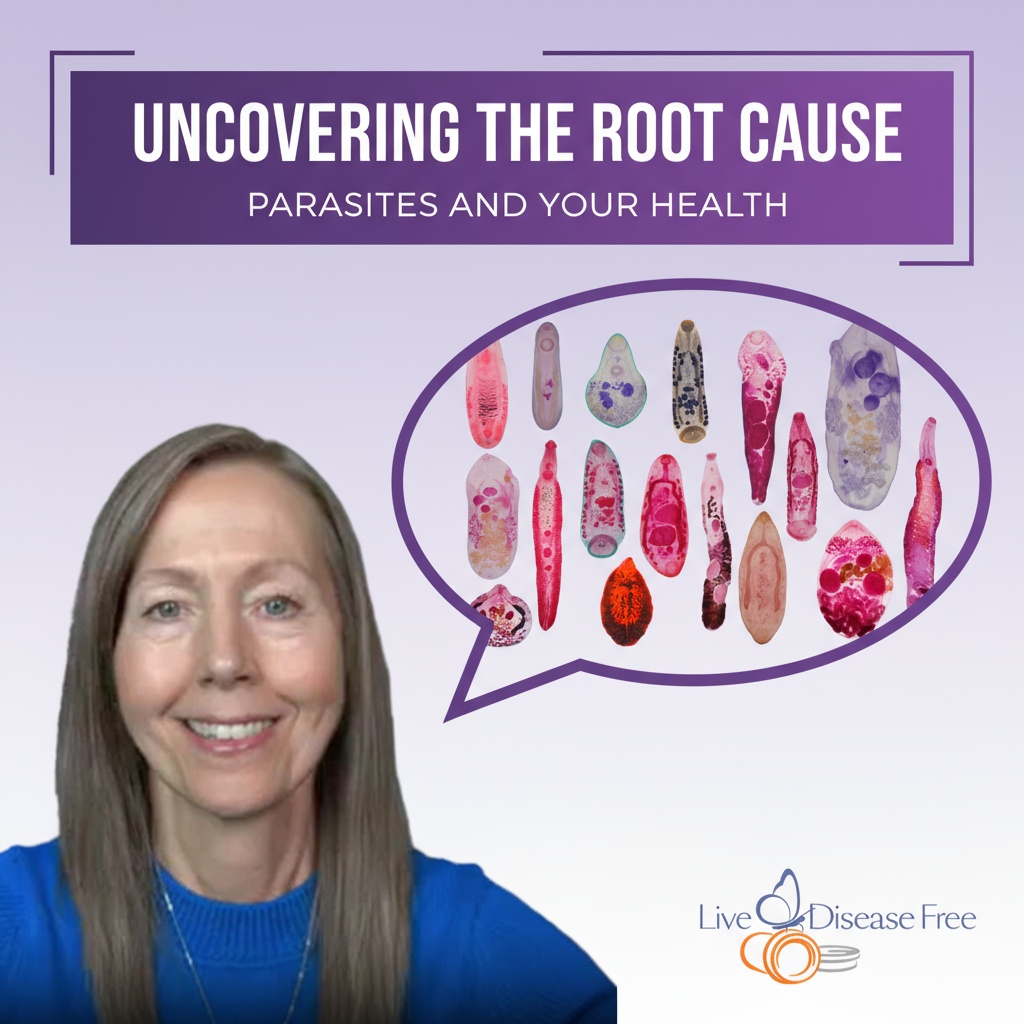You’ve probably heard it all before — “MS is incurable,” “manage your symptoms,” “hope for a breakthrough someday.”
But what if the breakthrough already happened — and it’s been ignored?
Pam Bartha’s story hits right where most of us have been: a devastating diagnosis, zero hope from specialists, and that quiet inner voice asking why?
Why are we managing instead of curing?
Why aren’t we asking what’s really causing the damage in the first place?
Over 35 years ago, Pam was told she’d be disabled for life. Instead, she’s been MS-free for decades. Not through another $100,000-a-year drug, but through addressing something medicine refuses to look at: a parasitic infestation.
Yes — parasites.
The missing link no one in mainstream neurology wants to discuss.
She connects the dots between:
Candida and fungal overgrowths found in the brains of MS patients.
Lyme-related spirochetes (bacteria shaped like tiny corkscrews) discovered in lesions identical to MS.
Roundworms and tapeworm cysts inside the central nervous system — documented by pathologists and ignored since.
Even blood flukes and protozoa linked to the same neurological symptoms labeled “autoimmune.”
Pam isn’t speculating — she’s drawing from a century of forgotten research and her own recovery journey.
And she does it without hype, without “miracle cures,” and without the price tag of a new biologic drug. Her message is simple but not simplistic: MS isn’t an attack from your body — it’s an infestation your body’s trying to fight.
That shift changes everything.
In her Health and Happiness Transcript — “Multiple Sclerosis is a Parasitic Infestation” — you’ll see how she:
Breaks down the real microbial landscape behind MS.
Maps the 4-step recovery plan she’s used to stay MS-free for 35 years.
Shares stories from “Wellness Champions” who reversed symptoms most thought were permanent.
If you or someone you love has MS, ALS, or any neurodegenerative label that “doesn’t make sense,” you owe it to yourself to read this.
It’s free, it’s evidence-rich, and it might be the most important dot you ever connect.
👉 Get the full transcript by sharing with 2 friends; fill in the popup or click this [link] (ask for German and Dutch translations through the email)

Now, mind you — don’t take my word for it.
Read. Think. Cross-check.
Then decide whether the real disease is the parasite… or the system that refuses to look for it.
Smarten up yourself.
And here is the video:

Make sure you visit her website "Live Disease Free"
What is generally referred to as 'the missing link no one's talking about' in the context of Multiple Sclerosis?
The phrase "the missing link no one's talking about" in relation to Multiple Sclerosis typically refers to an underlying cause, trigger, or a core mechanism of MS progression that some researchers and practitioners believe is overlooked or not fully integrated into mainstream understanding. Instead of focusing solely on the autoimmune inflammation, this 'missing link' perspective often points to more fundamental root causes such as:
- Chronic Infections: Particularly latent viruses like the Epstein-Barr Virus (EBV), or other persistent pathogens, that might initiate or perpetuate the immune response.
- Environmental Toxins: Exposure to specific toxins that could trigger neuroinflammation.
- Gut Microbiome Dysregulation: Imbalances in gut bacteria that influence immune function and overall health.
- Metabolic Disorders & Nutrient Deficiencies: Specific metabolic issues or critical nutrient deficiencies that could make an individual more susceptible to MS or exacerbate its progression.
How does identifying such a 'missing link' potentially change our understanding and approach to Multiple Sclerosis?
If a significant 'missing link' were definitively identified and validated, it would profoundly shift the current paradigm of understanding and treating Multiple Sclerosis. Instead of primarily focusing on modulating the immune system to reduce inflammation and slow progression, the approach would expand to include addressing the root cause:
- Fundamental Shift in Treatment: Therapies could move beyond symptom management and immune suppression to directly target and eliminate the underlying trigger (e.g., antiviral drugs for a specific virus, detoxification protocols for toxins, gut microbiome therapies, or specific nutritional interventions).
- Personalized Medicine: Treatments might become highly individualized, tailored to the specific 'missing link' identified in each patient.
- Early Intervention & Prevention: Understanding the link could pave the way for early diagnostic markers to detect the underlying factor before significant nerve damage occurs, and potentially lead to primary prevention strategies to avert the onset of MS altogether.
- Potential for Reversal: By removing or neutralizing the initiating cause, there could be a greater potential for halting disease progression, repairing damaged myelin, and even achieving sustained remission or reversal of symptoms.
Why might this 'missing link' not be widely recognized or discussed within the mainstream medical community or public discourse around MS?
There are several reasons why a potential 'missing link' might not yet be widely accepted or discussed within mainstream medical and public circles:
- Scientific Rigor and Proof: Establishing definitive proof for a 'missing link' in a complex, multifactorial disease like MS requires extensive, large-scale, long-term, and often costly research, including randomized controlled trials, which are challenging to conduct. Current evidence might be compelling but not yet considered conclusive by all.
- Established Paradigms: Medical science often evolves incrementally. Challenging established theories about MS (e.g., its classification primarily as an autoimmune disease) can take considerable time and overwhelming evidence to shift prevailing views.
- Research Funding Focus: Funding for MS research often flows towards established pathways and existing drug targets, making it harder for novel, less conventional 'missing link' theories to secure the necessary resources for comprehensive study.
- Complexity of Factors: MS is understood to be influenced by genetics, environment, and lifestyle. Pinpointing one single 'missing link' can be difficult when many factors might contribute.
- Commercial Interests: Treatments that might emerge from a 'missing link' discovery (e.g., dietary changes, specific supplements, or re-purposed drugs) might not align with the traditional pharmaceutical model, impacting research investment.
- Communication Challenges: Translating complex, emerging scientific concepts, especially those that are still debated, into clear and accessible information for both the medical community and the public can be difficult.
If a significant 'missing link' in MS were confirmed, what would be the most profound potential implications for future prevention and treatment strategies?
The confirmation of a significant 'missing link' in MS would usher in a new era for prevention and treatment, with profound implications:
- True Primary Prevention: If the link is something preventable (e.g., a specific infection, environmental exposure, or dietary pattern), public health initiatives could aim to prevent MS development in at-risk populations *before* symptoms manifest, drastically reducing incidence rates.
- Causal-Based Therapies: Current treatments largely manage symptoms and modulate the immune system. A confirmed 'missing link' would enable the development of therapies that directly address and neutralize the root cause, leading to more targeted, potentially curative interventions rather than just disease modification.
- Personalized Treatment Roadmaps: Diagnostic tools could identify the specific 'missing link' relevant to an individual, allowing for highly personalized treatment plans that are far more effective than broad-spectrum approaches.
- Reduced Disability & Improved Quality of Life: By targeting the fundamental cause, the potential for halting or even reversing disease progression would dramatically increase, leading to significantly reduced long-term disability and vastly improved quality of life for millions affected by MS.
- Shift in Research and Clinical Practice: It would trigger a global reorientation of MS research, diagnostics, and clinical management, opening up entirely new fields of study and therapeutic innovation.
How can individuals affected by MS or those interested in learning more responsibly explore and evaluate information related to a potential 'missing link'?
Exploring new concepts like a 'missing link' in MS requires a responsible and critical approach, especially given the complexity of the disease. Here's how to do it:
- Prioritize Reputable Sources: Look for information from established medical journals (peer-reviewed), major research institutions, and well-known MS organizations (e.g., National MS Society, MS International Federation). Be wary of anecdotal claims or sources lacking scientific backing.
- Consult Healthcare Professionals: Always discuss any new information, theories, or potential treatment approaches related to a 'missing link' with your neurologist and primary care physician. They can provide personalized advice based on your specific health status and current medical knowledge.
- Understand Levels of Evidence: Be aware that preliminary research, correlation studies, and theoretical models are different from large-scale, randomized controlled trials (RCTs), which are considered the gold standard for clinical evidence. New ideas often start with preliminary data, but definitive proof takes time.
- Maintain a Balanced Perspective: Be skeptical of claims promising quick cures or single, simple solutions for a complex disease like MS. True scientific breakthroughs are typically incremental and undergo rigorous testing.
- Focus on Well-Established Management: While exploring new frontiers, continue to adhere to your prescribed medical treatments and established lifestyle strategies (healthy diet, regular exercise, stress management) that are known to support overall health and MS management. These foundational practices can complement any future discoveries.
- Engage with Informed Communities: Participate in patient communities or forums that encourage evidence-based discussions and are moderated by healthcare professionals or informed individuals.
— Richard de Laat
Health & Happiness Transcripts
richarddelaat.com




